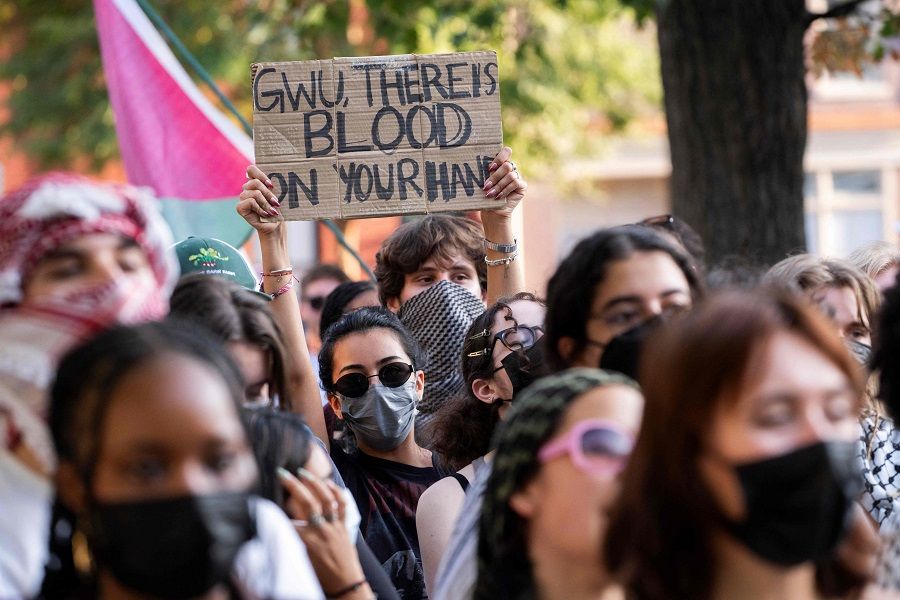US academic Wu Guo shares his thoughts as a Chinese American on who he hopes will become the next US president. Which candidate is likely to be more inclusive in their domestic policies and to promote dialogue and healthy competition between the US and China?
As it stands, there is a flood of analysis and commentary regarding potential Republican and Democrat policies towards China, or more simply, by Donald Trump and Kamala Harris. These analyses, whether from top Chinese international relations scholars or ordinary Chinese netizens, have generally reached a consensus: the two major US parties have largely agreed on viewing China as a serious challenge and threat.
The only difference lies in their strategies: whether to unite with other countries, manoeuvre diplomatically, and gradually contain and balance China’s influence, or to haggle with allies and confront China alone. Also, it is a question of proceeding steadily and predictably or acting erratically and unpredictably.
But for Chinese Americans who have settled in the US, some even naturalised with children growing up here, the idea that “it doesn’t matter who wins” does not hold because it concerns our direct interests.
Who becomes president matters to Chinese Americans
However, throughout modern US history, both parties have made advances in their China policies, each with its own emphasis. Therefore, observers in China might shrug and say, “They’re more or less the same; it all depends on how China responds.” Some may even take an extreme view, eagerly welcoming the one who seems to be more radical, hoping that he might mess up his own plans, which could end up “helping” China.
However, living in the US, I cannot be indifferent or think that it does not matter who wins, or even hope for a more intense storm. The reason is simple: for Chinese people living in China, this is indeed a drama to be watched from the other side of the river, just like when the pandemic broke out in China, and Chinese living in the US sent various supplies while Americans remained largely indifferent. But for Chinese Americans who have settled in the US, some even naturalised with children growing up here, the idea that “it doesn’t matter who wins” does not hold because it concerns our direct interests.

As a US citizen of Chinese descent, I clearly lean toward the Democratic Party. The reason is simple: according to the historical standards of the Republican Party representing the bourgeoisie and the rich, someone like me who makes a living by teaching certainly does not fit in.
Furthermore, the Republican Party has become the representative of anti-globalisation, conservatism, nationalism and racism in recent decades. Since I am neither white nor particularly “conservative”, and certainly not someone who has lived in the same inland area for generations without leaving the state, supporting such a party makes no sense. On the other hand, the Democratic Party’s support for globalisation and diversity aligns with my values.
Personal beliefs deserve respect, but I was struck by a well-known Chinese Christian woman who earnestly prayed for Donald Trump’s victory in the 2020 election and even published her prayer on her blog. While I select candidates based on my own preferences and the policies I support, I would not go so far as to incorporate them into my “prayers” or revere them in such a manner.
Elections are secular events and do not warrant such fervour. Voter turnout in American elections is already low and the number of devout Christians is also declining. Yet the significant support for Trump among Chinese Americans — many of whom converted to Christianity after moving to the US — raises questions that this article cannot fully address.
So far, only Barack Obama has broken the norm of a white president, and Harris’s election would break both racial and gender barriers, as well as the recent trend of older presidents in age.
My focus is not on the China policies of the two presidential candidates but on their characteristics and domestic policies and their potential impact on the US.
In my view, the US today indeed needs a president who breaks with tradition. So far, only Barack Obama has broken the norm of a white president, and Harris’s election would break both racial and gender barriers, as well as the recent trend of older presidents in age.
The US is indeed a unique country, where despite its diverse appearance, core power is assumed to be held by white men. Historically, most presidents have been descendants of British settlers and have been tall and imposing.
This implies that in the American cultural psyche, the person deemed capable of leading the country from its rough beginnings to a superpower must be a strong-willed white male. This is understandable but does not reflect the increasingly visible racial diversity, the rise of women in politics, and the demands of a new generation.

Even when Barack Obama was elected, I observed the situation calmly and did not join progressive Chinese friends in celebrating “Finally, we have one…” But today, I believe that if a non-white female president were successfully elected, it would be a major turning point in American political and ethnic history.
Even if this change is only symbolic or merely a victory for “identity politics”, it would still be welcome and worth looking forward to because female heads of state are nothing new in other countries; only America’s exceptionalism has constrained this.
Regarding predictable policies, I have never supported bans on abortion based on religious fundamentalism. Secular reasoning and common sense recognise that unintended pregnancies arise from a range of circumstances, and decisions about abortion should be based on individual situations, taking into account the fetus’s development.
Rigidly imposing a blanket ban based on religious beliefs is a regression. The trajectory of human civilisation is moving towards ensuring and respecting the rights of individuals based on secular principles, rather than rigid adherence to historical religions and their ideologies.
… if armed resistance to tyranny is deemed illegal when someone enters a government building, how can it ever be considered lawful?
The conservatism supported by the Republican Party also includes an obsession with guns. Like the abortion issue, the gun worship of American conservatives is astonishing. Guns with mass-killing capabilities have long become a significant threat to public safety in the US, with their negative effects far outweighing the supposed self-defence benefits. Strangely, the conservatives’ emphasis on the rights of embryos far exceeds their concern for the rights of living people.
The idea of “resisting tyranny” by bearing arms is self-deceptive because US law prohibits carrying weapons on federal government property. Social Security offices, for example, implement security checks to prevent weapons from being brought inside. In contrast, there are no strict gun bans in schools, which is why mass shootings frequently occur on campuses.
Regardless of the grandiose rhetoric surrounding gun rights, a basic question of common sense and reason remains: if armed resistance to tyranny is deemed illegal when someone enters a government building, how can it ever be considered lawful? This is the real-life “Catch-22”.
Harris’s running mate, Tim Walz, while a gun owner himself, shifted to a position against assault weapons after mass shootings occurred, showing that he can distinguish between personal hobbies and public interest. For that matter, as far as it is known, the Walz couple owns no real estate or stocks and has never been obsessed with accumulating private wealth.

During the Covid-19 pandemic, I also had questions. Why did the white American extremists who opposed mask mandates and sought freedom, and who rejected “big government”, never refuse the thousands of dollars in relief payments that only a “big government” could issue? Why didn’t they emphasise self-reliance and survival of the fittest at that time?
Greater chance for inclusivity
Given Kamala Harris’s immigrant background, mixed-race identity and female status, it can be expected that if she is elected, she will be more inclusive and supportive of immigration and cultural diversity.
This is not just a simple matter of “identity politics”. While the US faces the thorny issue of large numbers of illegal immigrants crossing the border, recent years have also seen a rise in white nationalism, xenophobia and a retreat from supporting diversity and inclusion.
Trump and his followers have fanned the flames in this process, consistently stirring up and exploiting the xenophobic sentiments of conservative white Americans, limiting diversity, and even condoning white extremist violence, creating a hostile social atmosphere.
Not all of Trump’s white supporters are economically disadvantaged, but they tend to be geographically isolated, narrow-minded, older, less educated and often impulsive and short-tempered in personality — what I would call the “spiritually impoverished” Americans.
Their common trait is not an economic condition but rigid conservatism. From the perspective of first-generation Asian immigrants, this trend and these policies among a population and group that already holds a majority in numbers and political-economic power are unlikely to benefit an Asian minority that is clearly at a disadvantage.
Human rights under racism-tinted lenses?
If we take the perspective of the “human rights” field that Tim Walz focuses on, first, I will say the definition of “human rights” has always been vague and is essentially a Western-centric concept. Secondly, the US is not a country with a perfect human rights record.
The world has also witnessed how the US government infringed upon the privacy of communication in the name of anti-terrorism, how it handled students who protested against Israel’s actions, and how it arbitrarily defined “legal” and “illegal” actions of the students.
Discrimination and hostility based solely on race and skin colour are burdens that the marginalised cannot easily escape. Hoping to improve China’s human rights is thus entirely different from hating China and its people.

Finally, and perhaps most importantly: human rights, if defined here as civic and political rights in modern societies, can be continually improved, expanded and enhanced in practice in all societies, but they can also backtrack. This means that in terms of human rights, all societies, including the US, have both room for improvement and the danger of regression.
Discrimination and hostility based solely on race and skin colour are burdens that the marginalised cannot easily escape. Hoping to improve China’s human rights is thus entirely different from hating China and its people. This is why I believe that the far-right forces within the Republican Party have a hopeless racist genetic makeup that could cause lethal harm to US-China relations and domestic interracial relations.
Of course, this is just a personal preference; I am not inclined to pray for Harris or anyone else, nor can I predict the election outcome. I might even choose not to vote on that day. Yet whether based on ideal visions or practical interests, a more inclusive, moderate, rational, and secular America would undoubtedly be better for me and my family than an extreme nationalist, racist, conservative and fundamentalist America.
Even from the perspective of US-China relations, the differences in style and method between Trump and Harris are significant. Trump’s crude and impulsive approach would not change, meaning that the possibility of US-China relations improving would be slim. On the contrary, Biden-Harris’s emphasis on coalition-building, respect for diversity, and diplomatic manoeuvring might offer more opportunities for dialogue, cooperation, and even healthy competition between the US and China.
It is a long shot, but in the current global landscape, a thoughtful, strategic approach might be the only way to navigate the complexities of US-China relations without descending into outright conflict and military violence.

